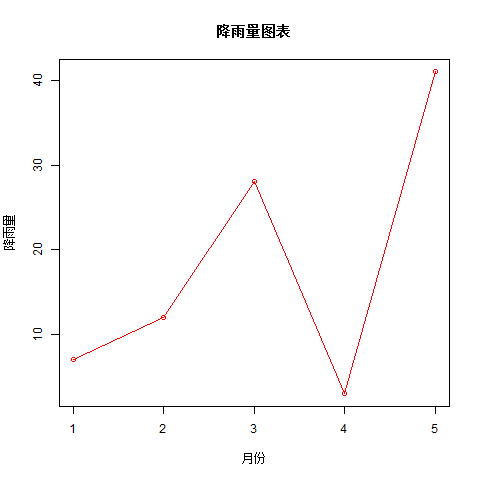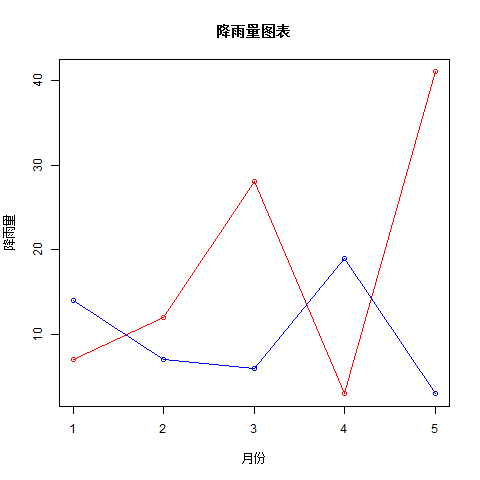R語言線形圖
線形圖是通過在多個點之間繪製線段來連線一系列點所形成的圖形。這些點按其坐標(通常是x坐標)的值排序。線形圖通常用於識別資料趨勢。
R中的通過使用plot()函式來建立線形圖。
語法
在R中建立線形圖的基本語法是 -
plot(v,type,col,xlab,ylab)
以下是使用的引數的描述 -
- v - 是包含數值的向量。
- type - 取值
「p」表示僅繪製點,「l」表示僅繪製線條,「o」表示僅繪製點和線。 - xlab - 是
x軸的標籤。 - ylab - 是
y軸的標籤。 - main - 是圖表的標題。
- col - 用於繪製點和線兩種顏色。
例子
使用輸入向量和型別引數為「O」建立一個簡單的折線圖。以下指令碼將在當前R工作目錄中建立並儲存摺線圖。
setwd("F:/worksp/R")
# Create the data for the chart.
v <- c(7,12,28,3,41)
# Give the chart file a name.
png(file = "line_chart.jpg")
# Plot the bar chart.
plot(v,type = "o", main = "降雨量圖表")
# Save the file.
dev.off()
當我們執行上述程式碼時,會產生以下結果 -
線圖示題,顏色和標籤
可以通過使用附加引數來擴充套件摺線圖的功能。如如可以向點和線新增顏色,給圖表標題,並在軸上新增標籤。參考以下範例程式碼 -
setwd("F:/worksp/R")
# Create the data for the chart.
v <- c(7,12,28,3,41)
# Give the chart file a name.
png(file = "line_chart_label_colored.jpg")
# Plot the bar chart.
plot(v,type = "o", col = "red", xlab = "月份", ylab = "降雨量",
main = "降雨量圖表")
# Save the file.
dev.off()
當我們執行上述程式碼時,會產生以下結果 -

多線條圖表
可以使用lines()函式在同一個圖表上繪製多個直接。
在繪製第一行之後,lines()函式可以使用附加向量作為輸入來繪製圖表中的第二行,參考以下程式碼 -
setwd("F:/worksp/R")
# Create the data for the chart.
v <- c(7,12,28,3,41)
t <- c(14,7,6,19,3)
# Give the chart file a name.
png(file = "line_chart_2_lines.jpg")
# Plot the bar chart.
plot(v,type = "o",col = "red", xlab = "月份", ylab = "降雨量",
main = "降雨量圖表")
lines(t, type = "o", col = "blue")
# Save the file.
dev.off()
當我們執行上述程式碼時,會產生以下結果 -
